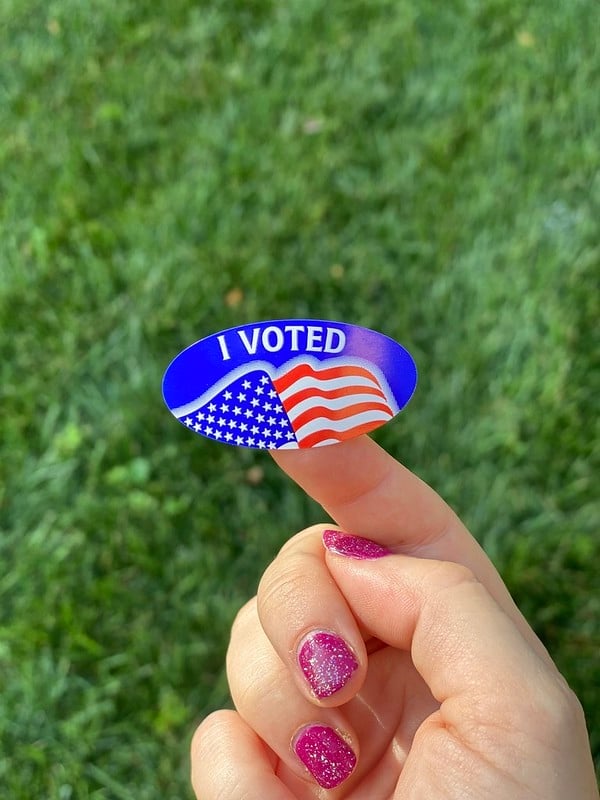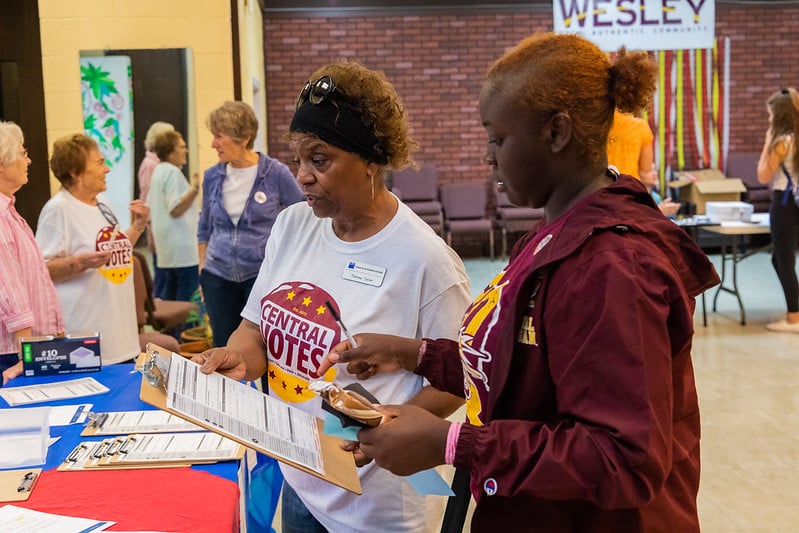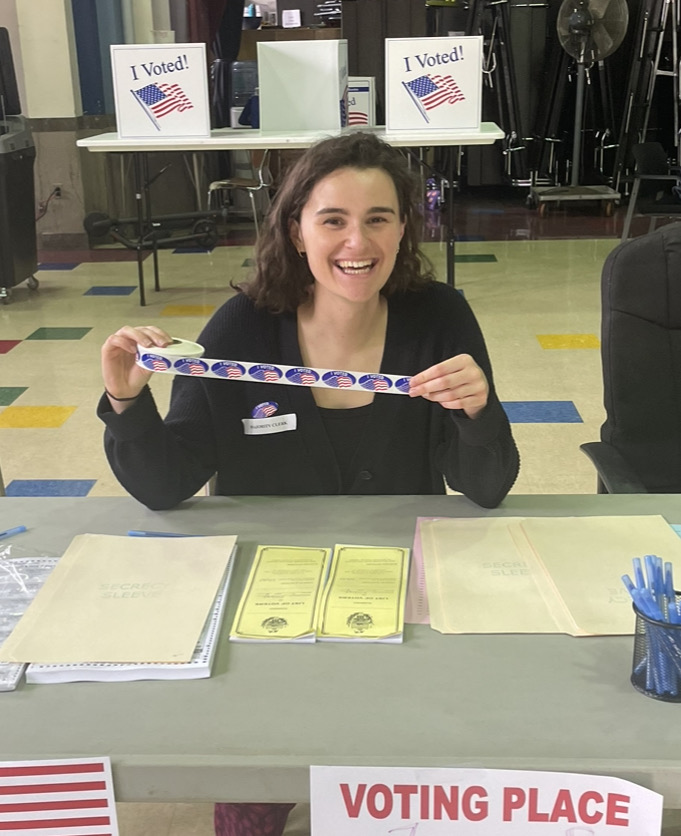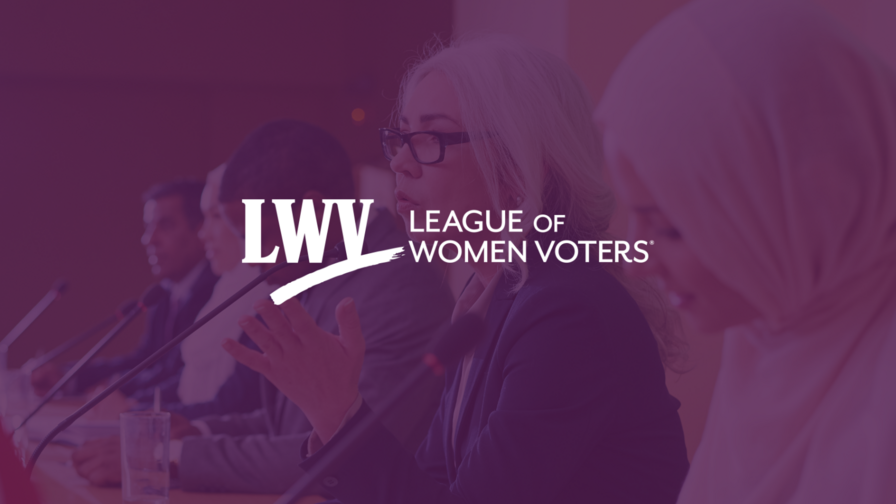Legal Trends to Watch in 2023
From January – August 2023, state legislatures nationwide passed various bills into law. While following these developments, the League noticed several important trends.
Some laws made voting less accessible, like those requiring photo IDs or limiting absentee ballots. Others restricted women's access to reproductive care and attacked the LGBTQ+ community.
There were also laws that expanded voting rights, restoring voting rights, automatically registering voters, and protecting election officials. Additionally, there was movement on the Equal Rights Amendment at the state level.
Below, we’ll dive into the trends we’ve seen in 2023 so far to better understand the challenges ahead.
Election Administration
Lawmakers in different states introduced bills that interfered with how elections are run, threatening the fairness of our democracy. For example, Montana's SB 117 banned officials from taking private donations for election costs. Texas' SB 1933 gave the state unprecedented control over the elections administration of Harris County, the seat of Houston. By limiting funding sources for election expenses and centralizing partisan state control over elections, these laws threaten democratic fairness by handicapping the ability of local elections offices to administer elections properly.

Voter ID Bills
Some states passed laws that made voting more difficult by implementing new or stricter voter ID measures. Idaho's HB 124 and Nebraska's LB 514 added additional ID and residency requirements to registration, making it more difficult to register to vote. Ohio's HB 458 was one of the strictest in the country, disproportionately affecting minority voters who may lack government-issued photo identification. As discussed in previous blogs, voter ID laws are largely ineffective at accomplishing their purported goals and add unnecessary barriers to exercising the fundamental right to vote.
Tell Your Representatives to Expand the Right to Vote
Absentee Ballot Bills
Following the COVID-19 pandemic, mail-in voting became popular, especially for people in rural or low-income areas with time, transportation, or geography-based constraints.
Despite this, some states passed laws to make voting by mail less accessible. Wyoming's HB 279, Indiana's HB 1334, North Carolina's SB 747, Ohio's HB 458, Arkansas's SB 258, and South Dakota's HB 1165 added barriers to the process like limiting assistance and shortening time frames for the drop-offs and corrections of absentee ballots. Arkansas and South Dakota even banned drop boxes altogether, which is the most preferred voting method for many.
Voter Registration
Lawmakers in several states introduced bills that made voter registration more difficult. These laws created barriers that will make voting less accessible for many people. Alabama's HB 209, Idaho's HB 340, Montana's HB 892, South Dakota's SB 139, and Florida's SB 7050 raised concerns about potential barriers to voter registration and democratic participation. Florida's SB 7050 made voter registration more complicated.

In 2023, some states passed laws that could make it harder for people to register to vote. For example, Alabama enacted HB209, which criminalizes absentee ballot assistance. The law also made it more challenging for groups to help people register voters by giving them less time to deliver registration forms and requiring extra paperwork. In Idaho, HB 340 made registration stricter by asking for more proof of who you are and where you live when registering to vote. Montana enacted HB 892, which adds strict legal penalties to people who vote more than once or even hold registration in multiple places. South Dakota enacted SB 139, which now requires people to live there for 30 days before they can register to vote, and they changed the definition of where you live.
In Florida, they passed an election bill called SB 7050 that added complexities to voter registration, along with other changes that could make voting more difficult. SB 7050 also makes a lot of changes to election rules, including ones that affect voter registration and might make it harder for some people to vote. These laws worry people because they might create barriers to voter registration and participation in our democracy.
The Electronic Registration Information Center
The Electronic Registration Information Center (ERIC) helps states share voter information to ensure accuracy. But some states decided to leave this group, which could make it harder to keep voter rolls up to date. Alabama, Florida, Iowa, Louisiana, Missouri, Ohio, and West Virginia left ERIC, which could cause registration reporting problems with elections and diminish trust in our elections.
Get involved in your state's policies by joining your local League.
Voter Purges
Sometimes, states remove people from voter rolls to keep the rolls accurate. If not done carefully and fairly, this can (and often does) stop eligible people from casting a ballot on or before Election Day. For example, voters are often accidentally removed from the rolls despite being eligible to vote and cannot cast ballots on Election Day. Mississippi's HB 1310 facilitates the removal of voters from the rolls due to their absence in two consecutive presidential elections. Additionally, some secretaries of state can purge voters from the rolls based on their own directives, as was the case in Ohio and Kentucky this session.
Threats to Direct Democracy
Some states sought to make it harder for people to change laws or the states’ constitutions. Arkansas' HB 1419 made it harder to gather enough signatures for legislative proposals, and SJR2 in Ohio increased the threshold for passing a ballot initiative from 50%-plus-one to 60%. These changes will make it more difficult for everyday people to have their voices heard.
Expansive Changes to Election Law
While there were challenges to voting rights, some changes were made to make voting more accessible. Minnesota's HF 28 restored voting rights to over 55,000 people previously convicted of felonies. Washington enacted laws to make it simpler to register to vote and expanded access to voting by banning guns from polling places and letting 17-year-olds vote in primary elections.
States' Voting Rights
Some states passed their own laws to protect voting rights and fight discrimination. Connecticut's HB 6941, Minnesota's HF 3, and New Mexico's HB 4 made sure everyone can vote. They required places with a history of voter discrimination to get approval before making changes to voting rules. These voting rights acts aim to fight discrimination, enhance language assistance, prevent voter intimidation, and improve accessibility to voting for marginalized groups. They also increase transparency through centralized election data and expand voting by mail while addressing barriers to voting for formerly incarcerated individuals.

Protecting Election Officials
Some states passed laws to keep election workers safe. Nevada's AB 354, New Mexico's SB 43, and Oklahoma's SB 481 prohibit guns near voting places and impose penalties for intimidating election officials. These laws ensure that both voters and election workers can participate safely in our democracy.
Emerging Issues: Restricting Reproductive and Transgender Rights
Several bills have been proposed targeting transgender individuals, banning and/or limiting gender-affirming health care for young people, restricting public restroom use, and more. These laws would negatively impact the well-being and safety of transgender individuals.
There are also attacks on reproductive rights, which limit access to abortion and other reproductive health care. Florida, Idaho, North Carolina, North Dakota, Nebraska, South Carolina, Tennessee, West Virginia, and Wyoming passed strict laws that make it harder for people to get abortions. These laws restrict women's choices and can harm their health.
Equal Rights Amendment
Efforts are underway to add the Equal Rights Amendment to the US Constitution, guaranteeing equal rights under the law regardless of sex. New York and Illinois made progress in passing their own state versions of this amendment. These laws would protect people from discrimination based on sex and other factors.
Tell Your Representatives to Add the ERA to the Constitution!
In the first half of the year, laws were passed that both helped and hurt our democracy. Laws were passed that made voting both more and less accessible. Advocacy work is essential to shape these laws and protect our democratic rights. We must address new issues, like laws that target transgender individuals and restrict reproductive rights. It's essential to work towards equality and fairness for everyone in our democracy.
Take action today by contacting your representatives around issues like voting rights, gender equality, money in politics, and more.
The Latest from the League
With the new year comes more litigation. In the past year, the League has continued our work of fighting against anti-voter bills and purges, challenges to new district maps, and pushing back against the increased attacks on reproductive rights. Here are a handful of the issues you may want to keep an eye on in 2022.
Ensuring elections are fair and equitable includes maintaining clean and accurate voter rolls.
The Electronic Registration Information Center (ERIC) is a nonpartisan membership organization comprised of state election officials from around the United States who have chosen to opt into ERIC, and the states that do so make up ERIC's funding. At this time, 26 states and Washington, DC, are members.
Voter ID laws have long been debated in the United States. While supporters argue that voter photo ID laws are necessary to prevent voter fraud and ensure the integrity of elections, reality tells a different story. Not only do these measures disproportionately impact Black, Native, elderly, and student voters, but they also fail to effectively address any real issues related to election integrity.
Sign Up For Email
Keep up with the League. Receive emails to your inbox!
Donate to support our work
to empower voters and defend democracy.






